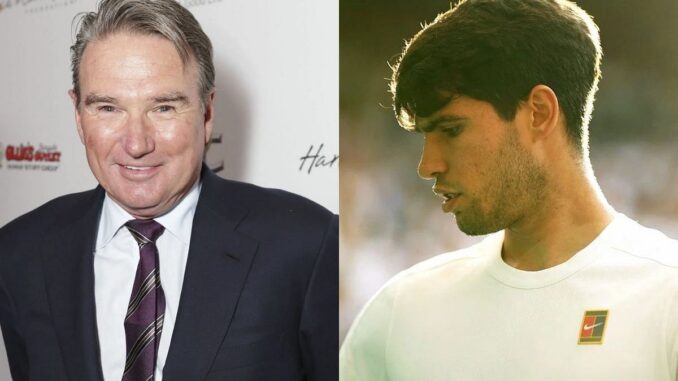
The 2025 Wimbledon men’s singles final delivered a spectacle that will linger in tennis history, as world No. 1 Jannik Sinner outlasted No. 2 Carlos Alcaraz in a thrilling four-set battle, 4-6, 6-4, 6-4, 6-4, to claim his first Wimbledon title. The match, a rematch of their epic French Open final just five weeks earlier, showcased the intensity of their burgeoning rivalry, which has captivated fans and redefined the men’s game. However, it was a candid moment from Alcaraz during the match that caught the attention of tennis legend Jimmy Connors, sparking a conversation about mentality and strategy at the sport’s highest level. Alcaraz’s mid-match admission to his coaching team—that Sinner was “much better” than him from the baseline—left Connors, a two-time Wimbledon champion, stunned, as he reflected on the psychological weight of such a statement in a Grand Slam final.
The match itself was a masterclass in resilience and adaptation. Alcaraz, the two-time defending champion, started strong, seizing the first set with a dazzling display of his signature flair, including a breathtaking backhand slice winner that left Sinner scrambling. His 20-match win streak at Wimbledon and perfect 5-0 record in major finals made him the favorite to join Björn Borg, Pete Sampras, Roger Federer, and Novak Djokovic as one of the few men to win three consecutive Wimbledon titles. But Sinner, fueled by the sting of his French Open loss where he squandered three championship points, flipped the script. The Italian’s aggressive returns and commanding baseline play shifted the momentum, breaking Alcaraz late in the third set. It was then that Alcaraz, visibly frustrated, turned to his box and declared, “From the back of the court, he is much better than me. Much better than me! Much [better]!”—a moment that Connors found astonishing.
On his *Advantage Connors* podcast, the eight-time Grand Slam champion expressed disbelief at Alcaraz’s willingness to vocalize such vulnerability mid-match. “That is a tough thing to admit,” Connors said. “I don’t know if I would ever have admitted that. No matter what, you have to get in there, mix up your game a bit, or try and do something a bit different.” Connors, known for his relentless competitiveness during his 1970s and 1980s heyday, emphasized the need to adapt under pressure. “I got my a— handed to me a couple of times at Wimbledon too. Everybody does. But if you are going to beat me, you are going to have to beat me. I am trying to play three different games,” he added, suggesting that Alcaraz’s admission might reflect a tactical rigidity that Sinner exploited. Connors questioned the long-term impact, noting, “If he is admitting that in the finals of Wimbledon, what does that do for Sinner’s confidence for what is upcoming?”
Sinner’s victory marked his fourth Grand Slam title, narrowing the gap with Alcaraz’s five, and snapped a five-match losing streak against his rival. His return game was pivotal, winning 36% of return points compared to Alcaraz’s 31%, a statistic Connors highlighted as the key to the match. “What wins you matches? That is what Sinner did yesterday. Returns. He returned the ball with authority and with purpose,” Connors said, praising Sinner’s ability to seize control from the baseline. Alcaraz, whose serve faltered with a 53% first-serve percentage and seven double faults, struggled to deploy his signature drop shots effectively against Sinner’s speed, a departure from his usual grass-court dominance.
Despite the loss, Alcaraz remained gracious, praising Sinner’s “well-deserved trophy” and their off-court friendship. “I’m just really happy about having this rivalry with him. It’s great for us, and it is great for tennis,” he said, reflecting on how their battles elevate the sport. The defeat ended Alcaraz’s 24-match win streak and marked his first loss in a Grand Slam final, but his positivity shone through. “I’m just happy. I’m smiling because in my head it was playing the final and I am grateful for that,” he said, a stark contrast to his emotional struggles after losing the 2024 Olympic gold medal match to Djokovic.
As both players head to the Canadian Open in Toronto, starting July 26, the tennis world anticipates another chapter in their rivalry. Sinner, now holding titles at three of the four majors, is the favorite on hard courts, where he’s won the Australian Open twice and the US Open once. Connors believes the faster hard courts, akin to Wimbledon’s surface, could amplify Sinner’s confidence boost from this victory. “The hard courts are not as slow as Roland Garros, they are going to be a little faster,” he noted, suggesting the North American swing could favor Sinner. For Alcaraz, the challenge is to regroup and adapt, leveraging his versatility to close the gap. With their combined seven consecutive Grand Slam titles, Sinner and Alcaraz are carving out a rivalry that echoes the Federer-Nadal era, and their next clash promises to be another unmissable showdown.
Leave a Reply